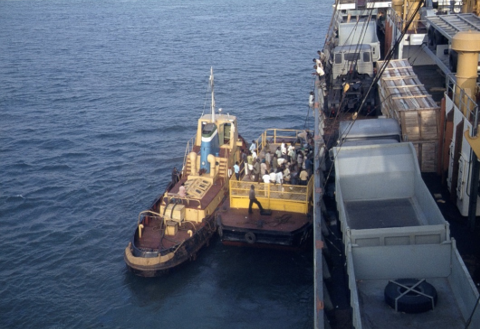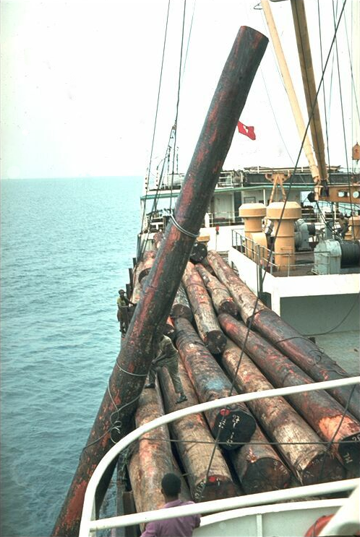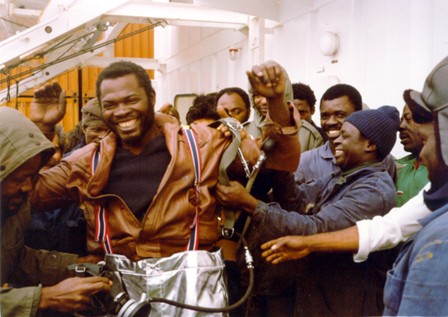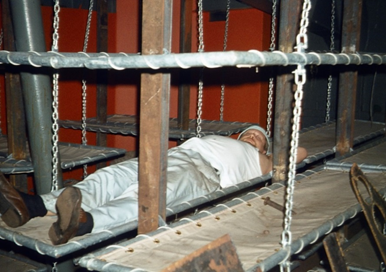
The Italian shipyard Cantieri Riuniti Dell'Adriatico, Monfalcone/Trieste built the HELVETIA on behalf of Nautilus Societa di Navigazione Marittima S.A. Lugano. The ship was launched on 16.01.1952 and was handed over to the owners on 08.07.1952 and registered under Swiss flag (call sign: HBDH). The management led the Italian company G.E.N. in Genoa.
As early as 1949, Bixio Bossi, head of the shipping company and member of the Council of States, learned that the Swiss Confederation was desperately seeking interested parties for its lira assets in Italy. With the help of the Swiss Confederation, Nautilus ordered a new freighter specially built for the West African trade from the Italian shipyard with a total value of CHF 11.05 million. This deal enabled the Confederation to reduce lira credit balances with the Italian state for CHF 8.75 million. However, it must also be mentioned that at that time, the same ship would have cost about half as much in Germany. The remaining 2.3 million francs were for the original Sulzer engine (type: 7SD72).
The HELVETIA sailed on the Nautilus liner service from Genoa to West Africa as far as Angola. Like most general cargo ships of that era, the ship also had deep tanks for palm oil (807 m3, located in front of the engine room), 3 cargo refrigeration rooms (341 m3 in the tween deck, aft of the engine and next to the provisioning rooms), as well as a magazine for explosive material deep down in the fore ship. For the heavy logs a 30-tonne heavy lift derrick was installed at the fore mast and a 20-tonne derrick at the aft mast. Similar to the BASILEA, the freighter was also equipped with a small motor tug, which hung in the forward davits on the port side until about 1967. It was used for towing logs, but then became redundant and was allegedly sold to the repair company A. Santamaria S.p.A. in the port of Genoa.
The officers lived comfortably on the boat deck, while the whole crew lived crammed together in small cabins for two and four on the main deck amidships. However, there was one big advantage, the ship already had air conditioning. The twelve passengers were accommodated in 4 double cabins and in 4 single cabins on the promenade deck. A peculiarity is to be mentioned, from the main deck there were no stairs leading up, one had to climb up the outside stairs, so passengers and officers were well shielded from the crew. Only a small food lift went up. The Kroo-Boys had their lodging under the forecastle deck.
When the Nautilus S.A. Lugano fell into financial difficulties and was no longer able to pay the federal loans, the Swiss government arranged for the shipping company to be taken over by Transoceanique S.A. Geneva, a company in which Keller Shipping, Basel had the say. On 01.07.1954 Keller Shipping Ltd, Basel took over full commercial and technical control of the Nautilus ships and thus also of HELVETIA, which continued to sail with her original name on the Nautilus Line to West Africa.
After Keller Shipping had taken over HELVETIA, the shipping company employed not only Italians but also Swiss nationals on board, mainly in the engine room. Later on, the Yugoslavs were added. The Swiss Captain Roberto Andry (1927) from Remüs GR, but living in Marina di Carrara, commanded the HELVETIA for a long time. The two Italians Alberto Messina from Trapani and Cadaletta from Molfetta sailed for many years as secondo di macchina (2nd) and terzo di macchina (3rd), i.e. they were 3rd and 4th engineer. In the Italian system the chief engineer is called direttore di macchina, followed by the primo di macchina (2nd engineer), same system as known from US-American and Liberian ships.
On 18.08.1978 Keller Shipping sold HELVETIA to Sociètè Generale d'Investisement S.A. Panama (Management: Fulmar Navigacion S.A. Piraeus). Renamed LINA Y and registered under the flag of Panama (callsign of HOWN). Sold to a Taiwanese demolition company in 1980. The ship left Hong Kong on 04.04.1980 for her last voyage and arrived in Kaohsiung on 03.05.1980.
Of all Swiss ocean-going vessels, the HELVETIA has sailed under the Swiss flag for the longest time, 26 years and one month (followed by the BASILEA, which reached almost 26 years).
SwissShips August 2020
Additional Information and Stories
The Krooboys on the ships of the West Africa trade
On the freighters of the different nations in the West Africa trade, a crew of Krumen or Krooboys always travelled along the coast of Africa, usually about 30 to 40 men. Usually, they boarded in Freetown, Sierra Leone or in Monrovia, Liberia on the way out and on the return trip they disembarked in the same port to return to their families. The crooboys at Keller Shipping boarded in Freetown. The main task of these men was to load and stow the logs, which were then taken over at various anchorages along the coast. They also helped with many maintenance tasks on deck and in the engine room.
Let Hans-Ruedi Fuchs, longtime with Keller Shipping and chief engineer, recite from his book "Ankerspill und Kettenkasten". As an Africa fan he observed these guys closely and recorded his experiences and insights for us.
The KrumenThe anchorage is called "Man of War" off the King Tom Peninsula in Freetown, Sierra Leone. On the port side of the ship is Kru Bay with the radio mast and on the starboard side you can see White Man’s Bay or English Bay. All right?
The ship and crew were cleared here at anchor by the authorities, police, customs and agency. There were many officials in uniform, each of them climbing up the rope ladder, always trying to find a sophistry in the certificates. Experienced over years, they always found some unexpected subject to confront the captain. Want an example? The water police suddenly demanded 4 lifebuoys at the gangway. The sailor looked for some on deck and put them on. It was discovered afterwards that on deck 2 life rings were missing.
Another example are the crew lists of the regular crew. Under the column "Place of birth" there is no entry in the Swiss passport. There is only a "Place of Origine", i.e. home town. The crew member is usually not born there. Or even worse, he/she has two home communities. The question then comes up, how can you have been born in two places? Hard for an Italian or Spanish captain to explain: "Steward, get me five boxes of cigarettes!" A fine could cost up to 5,000 USD.
Everything is regulated with cigarettes. Payment is Marlboro and no other brands. Most of the time.
The real reason why ships from Europe, such as those from the Nautilus Line, Woermann, Delmas, Black Star Line or Töpfer stop here is to sign on a crew.
Not far from the anchorage, on Alligator Brook, lies Krutown. A settlement of dunnage, corrugated iron and different, mostly orange ship colours.
The Krus are God-gifted fishermen who once immigrated from Liberia. When the European crew call them Kru-Boys, Krumen, Kroomen or Krooboys, this is purely a nautical custom and there is no disrespect behind it.

Arrival of the Kroo in Freetown (Photo: H.R. Fuchs)
The name Kru or Kroo can also, but rather unlikely, be a corruption of Klao favored by the English crew. There is much literature and research on the language and culture of the Krus. Already in the last century British and German shipowners hired black sailors on the West Africa route. The English terminology being, of course ‘crew’.
Here is an excerpt from an encyclopedia from the year 1911 which was unknown to me:
„They are traditionally from the interior, but have long been noted as skillful seamen and daring fishermen. They are a stout, muscular, broadchested race, probably the most robust of African people. They have true negro features – skin of a blue-black colour and wooly and abundant hair. The woman is of a lighter shade than negro women generally“.
During the 18 years I spent on the West African coast, I got to know people of cultural and political differences in a way that I still look back with respect and joy after decades.
Despite a medical certificate, similar to our health letter, it happens again and again that newly registered people come on board sick. A common complaint is beri-beri, a vitamin deficiency symptom that often raged on the ships in the century before last.
Traditionally, the 2nd mate under the direction of the captain is responsible for the on-board pharmacy.
I once watched with a smile as the mate let ten krooboys take a footbath with the remark that this is what Father Kneipp had recommended (Sebastian Kneipp 1821-1897, was a Bavarian priest and one of the forefathers of the naturopathic medicine movement). There must be some fun, and the Africans always played along bravely.
The krooboys, very much a hierarchically structured group, were entitled to a variety of food, which they needed during the two-month trip. The basic dishes theoretically consisted of sweet potatoes, sauces based on coconut and palm oil, manjok, tofu, millet, bananas and rice. The generally corrupt headman negotiated with the even more corrupt chief steward, and they dispensed with some side dishes. As compensation, the headman took broken rice from Northern Italy. A part of it was stored and saved until the end of the round trip to feed the families during the waiting time on land. The menu during the voyage was continuously enhanced by means of bartering with local traders coming alongside the vessel in their pirogues trading local produce. Bananas were traded for empty canisters, residual palm oil from the tanks to be cleaned against manjok roots. The fish were freshly caught and the spices belonging to each meal and basic dishes were exchanged for wooden dunnage from the holds.

Loading of logs on an open anchorage (Photo: H.R. Fuchs)
Predominant in this area of the West African coast are tubers like Manjok and Taro. Corn and peanuts are less known as staple foods. Unless the ship has a large cargo of peanuts from Nigeria, there is always something left over for the cook.
In African cuisine, food is always eaten warm. This resulted in the abundant use of wood and charcoal both onboard and ashore. Dishes like millet, manjok or rice are cooked, bananas and fish are fried. The sauces of piri-piri pepper and for me some mysterious herbs, are cooked for hours over the fire with palm oil. This was for me every time a welcome change to the tomato-contaminated dishes of the Mediterranean diet on board. Little meat from the European galley enriched the culinary everyday life of these people aboard.
Anyone who wants to eat at the Krus' courts will soon find out that African spices take some getting used to for the European stomach. Specifically the pepper and chili take some getting accustomed to and in no way similar to mothers cooking habits. It is not very common that the spices also have healing properties. As an "experienced" sailor you know the inner fire from India, Thailand, Mexico or from exotically rich cuisine of a friend. Botanically the chili fruits belong to the berry species of which there are hundreds. This I let the Kru cook explain to me, who had a surprisingly large general knowledge and did not spit out the beer we drank together from time to time. He was a practicing Muslim, who understood sinful drinks in the Christian, also in the Bavarian sense as also as food and medicine. I am no longer quite sure whether I had taught him that. Possibly. In any case, after a Kru-Boy dinner one has the wonderful feeling of sweating and thirst. Capsicum annuum, as we Latin people say after a few beers, kills pathogens, promotes perspiration, regulates the body temperature and is also a vitamin bomb. Our discussion on the cooking was as to the high level of African culinary art. Cayenne pepper, habanero, the classic jalapeno and pili-pili were known to the chef and he knew that too much of it affects the taste of breast milk.

Firedrill, always some kind of public entertainment (Photo: H.R. Fuchs)
The coconut oil, which is obtained by pressing the seed flesh of the coconut (originally not from Africa at all), is a basic element of African cuisine and, like palm oil, can also be sold on the market by the Kru women in bottled cola bottles. Unfortunately, more and more western goods made of plastic and junk from China are taking over at these markets. Very cheap and light are dried calabashes, which should actually replace the plastic containers.
The laundryman, who is always called "Max" on the ships, moistened the laundry with his mouth when ironing. So sometimes you think the smell is ‘to smell like an African whorehouse’ (only bad minds claim this). The laundry was white, brought into the cabin in an orderly fashion and washed again and again. We were privileged and spoiled.
Sometimes a calabash full of palm wine was pulled over the bulwark on board, which provided for tranquil and atmospheric evenings at anchor. This alcoholic drink is not only known in Africa. It is extracted and brewed from the sap of the cut flower of the tree. The Krus call it "Payo". It is not to be confused with mommy gin, which is chewed by toothless old women and spat back into the bottle for fermentation. With offers like this, I prefer a simple beer from Europe.

The berth of a Kroo Boy is tested by the chief engineer (Photo: H.R. Fuchs)
The Krus usually answered "yes" to a negative question. For example: "Didn't you find the hammer in the workshop? Answer: "Yes, Chief, I did not find it" meant "no".
Good and willing people were often employed as permanent staff on the ships. They acted as ordinary seamen, stewards or cleaners in the engine room. The same rights and wages as Europeans meant a small lottery win for their struggling families in Freetown.
Adam and Eve
The following section, is written in West African pidgin English. The author is not known to me. The story has been lying in my “henhouse” for over 30 years now and is crying to be published.
Creation Story as told by the Kruboys – “Adam and Eve”
Dhem first, first time, you savvy, nothing no live, dhas all, God he live, no other thing, no ground, no wata for himself, all he be mix like so pota-pota. Dhen God he begin: he part hem, some place he put dhem ground, some place he put dhem wata. But man no fit look hem. By and by God he say: “Better I go make some lantern.” So he hang one big one, and he call hem say “Moon”, dhen he fix plenty small one for up, and call hem say “Star”. Dhen he begin for making all other thing. He make all kind of beef, he make bush, he make farm too. After dhat he say: “ How, I no get no people!”Dhen he take some ground for hand, he mash hem, and he make dhem stand like man. He call hem, say: “Be kruboy.” After dhat he put hem for some big garden; plenty chop live dhere for inside, plenty cassada, plenty makabo, plenty fruits, plenty palmoil, all kind beef too he live, dhas all. Work no live, so dhem place he be fine too much.
Dhem God he talk for dhem Kruboy: “I live for give you dhis fine garden for sit down, all them thing for inside I dash you.” So dhem kruboy say: “Thank you, Massa.” He sit down for dhem garden, he waka here, he waka dhere. He waka all for himself, he waka so-o-o-t-e-e he tire.
One day he come for God, he say: “ Massa, I come for you, I get some p’lava for tell you; no be you; you make me? No be you, you put me for dhem fine garden? You no look out for me propa. Dhem garden you done put me, he fine too much. I like hem bad plenty, but all dhem chop he live for spoil, becos I no get woman for hem. I think, better you dash me one”.
God he say: “ All right, no p’lava no live, I go give you one, make you sit down, you wait small”.
Dhem Kruboy he wait t-e-e he tire, he sleep. So God he begin. He cut hem, he broke hem some bone, he take hem, he make hem turn up like woman. Before them Kruboy finish for sleep, God call hem, he say: “ No be them woman dhis, I dash you”?
Dhem, as he look hem, he say: “ Dhem woman he be hem, he fine past mark.”
Now, God he say:”Becos you live two, make me go give you propa name.” He call dhem man say : “Adam”, dhem woman he call dhem “Eve”. He say: “ All dhem fine thing he live for them garden, he belong for you. You fit get hem, only I tell you some one p’lave: you look dhem propa fruit for up dhem big stick for mindro (middle) garden, people live for call hem say: Happel. Dhem one you must not chop, you hear?”
Dhem he answer say : “Yes, Sir!”
“If you chop hem, big palava live for some, you hear?”
He say: “I hear”.
Before God he moov, he left hem for himself.
By and by dhem Kruby he sent dhem woman for bush, for cut some firewood. Dhem woman he go, before he pass dhem stick, one time he look some snake, he live for up. Dhem snake he call hem, he tell hem plenty sweet mot ( mouth ).
He say: “How, you no look dhem propa fine fruit, he live for up?
You no like chop hem?”
Dhem woman answer: “ No”. So dhem snake say:” I tell you true, dhem happel he sweet past sugar, you no want hem?”
Dhem woman say: “No. Be God he make. Make no man chop hem; if man chop hem, he go die one time.”
Dhem snake he answer, say: “How, I think God live for Humbug you, dhas all. No care, make you chop small, no p’lava”.
So Eve begin take some happel, he chop hem hals, before he bring hem other half for Adam, he tell hem say: “You too, you must chop dhis sweet fruit, saby?” So Adam he take hem, he chop hem.
One time, big Tornado live for come. Dhem people fear, he run, he sit down for inside bush. One time, God he come, he find hem t-e-e-e he no look hem, he ask hem say: “ Wa’s matta, hooside dhem happel live? You done chop hem?”
Adam answer say: “ No dhem woman, you dash me, he done chop hem, dhem time he live for bush for broke firewood”!
God he say: “You lie for me, look propa, you too chop hem!”
Dhem people begin for cly ( cry ). God he wex plenty, he halla strong, he cos ( course ) hem bad, he say: “ I tire for you, I no want look you more for my fine garden. One time for you go for carepenter, make he give some kruboybox, dhere you put all your things for inside.” And God he say:” You look dhem big Nautilus steamer dhere? You go work dhere all your life!”
After dhem people he go. God he call dhem big boy, dhem one he name “Gabriel”. He tell hem, say: “ You must take your cutlass, dhem one plenty fire live for come out, say?”
Gabriel he stop dhere. Before dhem people come back for them carpenter place, God he halla, say: “ Move”! So dhem people he run. One time God he give order for Gabriel, say: “ Look out propa, make dhem bushpeople no come back. If he come more, you kill hem. Finish p’lava!”
SwissShips HPS, JTA, September 2020